If someone asked me what I could offer them to convey the “mission statement” of science fiction, I would hand over a copy of District 9 without thought.
There’s no way of getting around it; this film does what all good science fiction is meant to do. It elaborately disguises the world we know to make us forget how the everyday works just for a while. Bind your story in the confines of reality and many of us will shut down, ignore it, emotionally switch off. Can you blame us? We are constantly bombarded by negative media—every newspaper, every documentary, every piece of historical fiction attempting to prove how gritty and awful the world can actually be outside of suburbia, or the city, or the country. We know that it’s bad. We don’t want to know anymore, and so we go to see dozens of popcorn films a year to help us forget.
But if you couch these ideas in a story that is not set in a reality we recognize… then, you might get people to listen.
I have a confession to make: when I first saw District 9, I almost walked out of the theater. For the first and only time in my life, I almost left without getting to the end of a film.
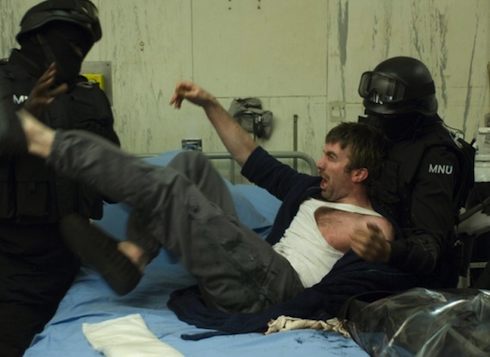
It happened when MNU captured Wickus and used him to perform weapons tests using “prawn” firearms that humans had never been able to wield. He was begging them to stop. They forced him to kill one of the aliens, using electric shocks to provoke the muscle response needed to fire. Then they prepared to “harvest” the morphing parts of his body before his transformation was complete. His new alien limbs would be valuable to military developers, of course, so there was no time to lose. When they began the operation, I could feel my chest clenching and I started to hold my breath; I was already in tears, thinking to myself—if something doesn’t change right now, if it doesn’t get better somehow, I won’t be able to take one more second of this.
Wickus escaped and I remained in my seat, but I will never forget how powerful that emotion was, how I sat there gulping air for the next ten minutes as I tried to regain some kind of equilibrium. This film had put me through something brutal, something I hadn’t been prepared for.
This film was absolutely right to do that.
The direct allegory running through the story is easy to recognize: District 9 is a reference to District 6, an area in South Africa where 60,000 colored Africans were evicted from their homes during apartheid in the 1970s. The atrocious behavior of MNU’s employees and their thirst for better firepower is a commentary on the private military contractors being used by governments today, specifically Xe Services (formerly known as Blackwater Worldwide). Choosing to zero in on these two topics seems logical: the film was set and shot in South Africa and the potential problems associated with military contractors are a modern concern.
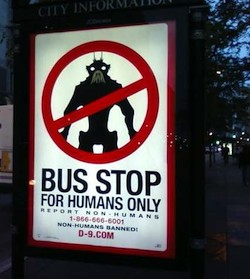
But that is not the only commentary you find in District 9. In some ways, the film is a proverbial map of human suffering; the choice to relocate the prawns relates not only District 6, but to the Trail of Tears that destroyed the Native American way of life, and to interment camps in any number of countries around the world. The experiments that MNU subject the prawns to are reminiscent of the medical experiments done on Jews during the Holocaust. The fact that they give the aliens anglicized names calls Ellis Island to mind, where immigrants had their “unpronounceable” names changed to something simpler (read: English).
The journey that Wickus takes strikes a chord because he does not begin as the outsider; we become the “other” with him, we experience every horror, every unimaginable change, at the same time he does. His instantaneous rejection by society at large represents a very real human fear that exists outside of his metamorphic dilemma, and makes his own terror even more palpable. There is a cutting irony to Wickus, however; his monstrous father-in-law, in an effort to get his daughter to write her husband off as long gone, reminds her that he had “never been strong.” But strength is exactly what Wickus gains as he changes, a will to overcome that he had never been equipped with in his former, far easier life.
Perhaps it shouldn’t be at all surprising that the character who reflects every positive aspect of humanity throughout the film happens to be Christopher Johnson, the prawn who offers to help Wickus. Christopher is intelligent, honorable, and kinder at heart than anyone else we come into contact with in the story. Every moment that Wickus doesn’t measure up to the high bar set by Christopher’s character is another moment when you’re forced to look at humanity, at yourself, and decide what sort of person you think you would be in their situation.
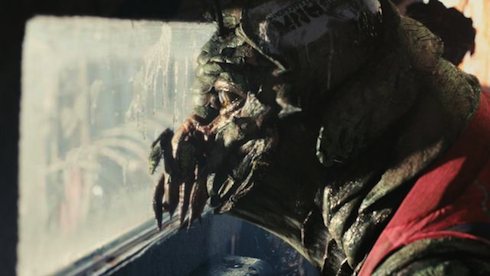
The prawns are far from pretty—in the human sense—and the choice to give them a more insect-like appearance was a brave move on the part of director Neill Blomkamp (apparently, he wanted them to be even more unpleasant-looking, but was aware that it would be difficult for a human audience to relate to a figure that didn’t possess a face and eyes that we could really look into). You feel empathy for the aliens in District 9, but it’s not empathy that is triggered by your impulse to cuddle them like newborn stumbling puppies. Their appearance forces you to relate to them on an equal level (though the humans in the movie clearly don’t), as beings of thought and feeling.
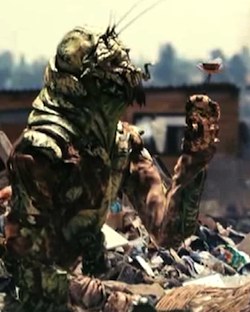
Love drives this film just as powerfully as hate and lust for power and lack of understanding; Wickus wants his wife back and Christopher wants a good life for his child. The presence of that love, though it does not receive the film’s focus, is a lifeline to the audience, a reminder of what is good about being human. The knowledge that Wickus is still leaving gifts for his wife at the end of the film, the suggestion that perhaps he has not given up hope, provides a relief in the end that Christopher’s escape cannot.
Even with the levels of torment that the characters in District 9 are subjected to, one of the most unsettling aspects of the story is how everyone continues to act in their own interests far beyond the point of reason. It is possible that the lesson of this film is contained in an idea of unity—of fostering not just the means, but the desire, to keep a bigger picture in mind and relate to each other. A little bit of selflessness is the only way to breed understanding, as proven when Wickus finally turns back to save Christopher’s life.
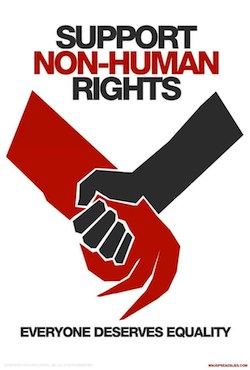
The ideas presented in District 9 are vital to each and every one of us. It is what every living human being needs to think about, but also what we are so desperate to ignore. This is what science fiction should be, this is what it can do. The next time someone tries to tell you that your favorite genre holds no purpose, you sit them down to watch District 9.
You show them how to use the past to decipher the future, and how it teaches you to be better.
Emmet Asher-Perrin supports non-human rights. You can bug her on Twitter and read more of her work here and elsewhere.










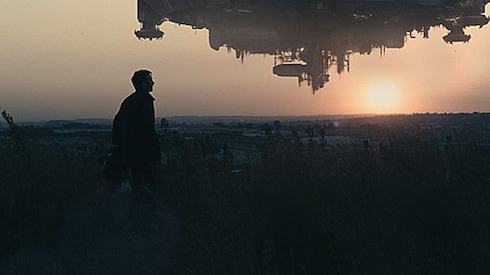
There’s also the subtle clue that humanity is in deep, deep, deep trouble in a couple of years. (Based on where the ship seemed capable of going, and who would be around to describe humanity to the residents at the end of the trip.)
Half of this movie my sister was in tears and I had a knot in my throat. Very few movies get to snatch such a visceral, emotional response from me, and it did confirm this same thesis I hold for the genre as a subtle mirror for ourselves.
I am glad to hear that someone else felt this way because I found this film completely gut wrenching in a way that other, more ‘worthy’ films with ‘an important message’ have not been. I did cry during this film and I had to hug my puppy when I went home, I was so gutted from watching it.
So well done to the movie makers!
I had a similar reaction to both the book and movie the Road. As a father of a 4 year old they provoked intense emotional responses in me. My wife came home just after I had to stop watching the movie and immediately jumped to the conclusion that something awful had happened to a loved one based purely on my expression and demeanor. I didn’t quite have the same reaction with District 9, but it definitely moved me that direction.
Brava! And very much agreed. I wanted to use this film in my intro English lit courses as the close to the semester, but I concluded it was too hard a road to force students down (I make them watch Pan’s Labyrinth instead. Clearly I need help). But the ideas in this difficult film are ones we need to grapple with. Great tribute!
D9 did a brilliant job of turning the concept of the “Other” on its head. It reflects any human conflict where people are treating others as “less-than-human.” But I am fascinated by Wickus’s transformation. How is that possible? Are the aliens really humans from the future that went through radical evolution to be adapted for space travel?
An ugly, ugly, brilliant movie. I don’t think I’ll be able to watch it again.
I’m not sure if this is true; maybe someone here can confirm or debunk it:
At the beginning of the film, a bunch of (human) people are interviewed about “the refugees.” What to do with them, etc. The responses are pretty uniformly ugly.
Those people were, if this report is true, not actors. They were South Africans — white and black — being asked about the actual, real, human refugees who had recently fled to S.A. from economic troubles (in Tanzania?).
Great Appreciation, I also were in tears during that movie, but the most gut wrenching and horrible scene was, when Wickus at the beginning of the Film talks calmly about unauthorized nests and that they have to burn them out! That was such an seemingly normal thing for them that they didn’t even think twice about it, that I nearly had to throw up during their “cleansing”!
P.S. Love the “Support Non-Human Rights” badge. I’m stealing that for my fb photo.
(Minor, pedant’s point: Ellis Island didn’t change anyone’s name. They took the names straight from passenger manifests from the ships that brought people to the US. Sometimes names were incorrectly reported there due to carelessness or a tin ear for “foreign” names, of course. Immigrants also frequently chose to change their own names — either Anglicizing them beforehand and giving that name when they travelled, or changing their names after they came to the US once they realized that a more Anglo name would reduce discrimination.)
After rewatching it, I came to really like this movie. But the first time, I just cracked up when the Human Rights groups were complaining about the treatment of Aliens. I couldn’t take it seriously after that. And honestly, it was so ham handed in setting up one side as absolutely evil that it really didn’t seem all that poignant to me. I prefer my political commentary in shades of grey rather than black and white, even if it takes place in South Africa. But the acting was superb for an action flick.
@Stefan Raets, #7:
I think you’re right. Blomkamp made a short film called “Alive in Joburg” that was the seed idea that District 9 developed from. From what I remember (and Wikipedia backs this up), all of the interviews in the short film that don’t mention the aliens explicitly are real interviews with South Africans asked what they think about refugees from Zimbabwe.
I assume that the interviews in District 9 were done the same way, but I’m not sure.
@cmpalmer:
Thanks. I got the country wrong.
Something I liked:
The aliens are NOT “virtuous others” who seem to exist just to teach us a valuable lesson. They don’t glow, wear silvery robes, or have magic healing powers. Most of them do appear degraded, despicable, and desperate.
Not making it easy to care about the “bugs” is part of what makes the film brilliant.
Stefan Jones @@@@@ 13
Not to mention cat food addicts!
I was deeply impressed by the moment when Wilkus and Christopher get into the torture facility and we see the facility through Christopher’s eyes This is not a buddy picture where the mismatched partners learn to respect each other; Christopher has to visibly struggle to restrain his rage against the only human within reach (and one who had been part of the same organization that had tortured and killed his friends).
Brilliantly done movie. And also one I don’t think I can watch again, as much as it gripped me.
What really amazed me was people I knew complaining that the sets were overdone to make things look squalid. Most of the filming took place in an actual slum in Soweto, only cleared of the original inhabitants immediately prior to filming.
The other thing I liked was the massive complaints that came out after the movie depicted the Nigerians as running the gangs in the camp. Yet my flatmate, who is a very liberal South African, mentioned that that was fairly true to life as well – most of the criminal gangs are controlled by interests from outside SA as they are the ones with the resources. The homegrown gang structures were either largely disbanded or legitimised and folded into existing power structures following the transfer of power in the country, in accordance with the tribal nature of most African politics.
Should have won the Hugo award; it is both an excellent SF movie and wonderful social commentary.
Critiquing it, I’d have to say that the only real quibbles worth mentioning is the transitional phase from documentary style to action movie (though I don’t know how it could have been handled better and I’m pretty sure it could not have remained documentary throughout) and the ending, which was a little trite and using somewhat worn out metaphor.
It’s entirely open for a sequel, which I’m torn on whether I’d like to see or not.
Sometimes, driving around in Johannesburg I still look up and expect to see that space ship hanging above the city… for those of us living in JHB and South Africa, the movie had an impact far beyond the expected reaction. Even those who don’t watch SciFi movies went to see it and were talking about it (and how it relates to and reflects our our lives) for months.
Coming soon after the Xenophobic attacks in our country it was especially poignant…
@@@@@ #13,
absolutely agreed! it would have been easy to make these guys down-on-their-luck mystical voyagers, benevolently amazing but misunderstood.
the kick in the teeth for me was that *no one* in this movie was easy to care about. there’s nothing in here to suggest a standard awesome hero + sidekick action flick. wickus’ transformation from human to prawn isn’t the most amazing part, it’s his transition from utter slime to someone we actually care about that just blows me out of the water. he’s a little weasely slimeballl at the beginning, casually burning out homes, tossing around racist statements, joking on camera while the shantys burn behind him. worse, he’s not even a slime ball with a plan, he’s just an obnoxious little pencil-pusher who does all this stuff unquestioningly because it’s his job. you hope that something suitably bad will happen to him, and when he takes a face full of black goo, you can’t help but think he deserves it for being such an idiot.
but somewhere between then and his horrific torture-trials of the alien weapons, you don’t feel that way anymore. he doesn’t deserve it, no one deserves this. he never becomes someone worthy of the aliens abandoning their one shot at a ride home, but I certainly care about his survival, and hope for his future.
It may be a function of the documentary-style technique, but I was amazed at how many people I know who were afraid to see District 9 in the theater. Not afraid of motion-sickness or anything, but seriously creeped out by it. Then when word of mouth spread about the disturbing and gross parts, they were even more convinced not to see it. And I’m talking about people who enjoy horror and bloody violent zombie movies.
Even in this thread, there have been many “It was great but I can’t watch it again” comments. It’s interesting to me that the more “real” the story and characters are, the more disturbing the violence is and when you combine that with an examination of racism and xenophobia (obvious even from the trailer), you get a great movie that no one wanted to see. Which is a shame, because it is a great and important movie.
For the record, I was morally disturbed when the aliens were being used for weapon’s testing, but only really grossed and scared by the gang members wanting to eat his arm *shudder*, since it reminded me of real news stories I’ve heard.
The only weakness of the story in my opinion was the physical transformation of Wikus. I understand the dramatic reason behind it, but the lack of science or even an attempt at a plausible explanation was disappointing.
Am I the only one who thought the whole premise of this movie didn’t make sense. Aliens cross interstellar space in a starship the size of a city. When they get here we lock them up in concentration camps??? Personally I think we should be giving them all the cat food or water or whatever else they want. Why? so they don’t force us to “Kneel before Zod!”
District 9 is not really about the Apartheid period in South Africa. Everyone makes that connection because that’s what everyone knows about the country and expects from its art. The connection to District 6 is little more than a reference or trace . The movie’s allegory is more appropriately tied to the status of refugees in Africa (South Africa in particular). Africa has a disturbing history with refugees, mass deportations, and international corporations.
I guess I’m one of the few who felt it was so heavy handed, obvious, and contrived that I thought it was actually meant to be a spoof. I laughed through most of it.
LISTEN!
I’ll rather be that prawns aliens then be the so called ‘human’! It is actually what happening in our real life now. You wouldn’t know how many people & animal their had torture & kill just to make 1 focckin LIPSTICK!! Damn im disgusted to be human!! Fckk!!
Well written, and I agree with most of what you said. However my take on the movie was more of a different look.
To me the movie showed that the humans were the monsters and not the aliens. The human race, in this movie, saw these aliens as subordinate species or ugly creatures/animals. Yet if you noticed the whole movie revolved around humans creating events that ended in aliens getting killed, aliens getting mistreated, etc.
The aliens in this movie didn’t do anything at all. I mean the movie revovled around 2 aliens and Wikus right?
Once again I believe that the message was:
Humans are the monsters, not aliens.
Christopher Johnson does not display humanity throughout the whole film. He clearly has no clue how to fix Wickus’ arm and tells him a story to get him to help him. You can just feel it in his posture and mannerisms that he’s full on lying and It becomes especially obvious when later he’s like: oh, yeah; it’ll just be three years before I fix your arm. I just need to fly all the way to my home planet and get the medical personnel who know how to do that and an army to conquer this planet of savages and then I’ll get right to fixing your arm.
The scene where protagonist is being tortured, did exactly what it was supposed to do, and you were going to leave the theater? It had you feeling his pain, suffering along side him; that feeling is RARE as hell in movies today. I’m not a general audience, and this movie is perfect in its entirety. More movies /TV shows should try delivering a message, without beating us over the head, like Godzilla King of the Monsters, or the Charmed reboot.